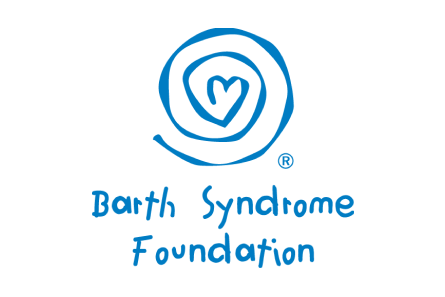Barth Syndrome Foundation
Cycle 3
Barth syndrome (BTHS; OMIM #302060) is a serious X-linked genetic disorder, primarily affecting males. It is caused by a mutation in the tafazzin gene (TAZ, also called G4.5), resulting in an inborn error of lipid metabolism.
Last updated 04/30/2025
Clinical
Disease Class
Cardiac diseases
Genetic diseases
Hematological diseases
Inherited metabolic disorder
Body Systems
Cardiovascular / Circulatory
Digestive
Endocrine
Hematopoietic / Lymphatic / Immune
Metabolic
Muscular / Skeletal
Renal / Urinary / Excretory
Organs
Blood
Connective tissue / joints
Heart
Intestines
Mouth / teeth
Muscles
Pancreas
Stomach
Known Genetic Link
Yes, one or more genes directly cause the condition
causative_genes
TAFAZZIN
contributory_genes
None specified / unknown
Type of Inheritance
X-linked recessive
Newborn Screening
No
Disease Mechanism(s)
Aberrant immune response
Enzyme deficiency
Inherited metabolic disorder
Lipid metabolism disorder
Mitochondrial defects
Mitochondrial disorder
Pathogenic mutation
Age of Onset
Early childhood (age 1+-5)
Infancy (age 0-1)
Middle childhood (6-11)
Prebirth
Average Age at Diagnosis
Early childhood (age 1+-5)
Infancy (age 0-1)
Life Expectancy
Adulthood (age 18-64)
Early childhood (age 1+-5)
Affected Sex(es)
Male
National Prevalence
101-1000
Global Prevalence
101-1000
National Incidence
Less than 10
Global Incidence
Less than 10
Symptoms / Phenotypes
cardiac abnormalities
failure to thrive
fatigue
gastrointestinal disorders
myopathy
neutropenia
Biomarkers
Diagnostic
· TAFAZZIN sequencing, MLCL:CL ratio
Existing Therapies
Expanded access (Compassionate Use)
Organizational & Research
Cell Lines
iPSCs
Lymphoblasts
Cell Lines, Institution
Boston Children's Hospital
Kennedy Kreiger
Cell Lines, Involvement
Consulted
Cell Lines, share
Some of our cell lines are freely available
Disease Model
Mouse
Disease Model, Involvement
Funded
Own
Disease Model, share
All our disease models are freely available
Clinical Trial Role
Data sharing
Focus group
Meeting with regulators
Recruitment and outreach, patients
Results dissemination, publication
Study material design, review (not protocol)
Biobank, Institution
Johns Hopkins Hospital
University of Florida
Wayne State University
Biobank, Involvement
Consulted
Designed
Funded
Center of Excellence, Institution
Kennedy Kreiger
NHS National Barth Syndrome Service
Center of Excellence, Involvement
Consulted
Designed
Funded
Registry
Yes, we have a registry that we created
Data Collected, Registry
Clinical data
Genetic data
Longitudinal natural history data
Medication usage
Patient contact info
Patient-reported data
Data Entered by, Registry
Patients
Platform, Registry
Invitae Patient Insights Network
Other
Natural History Study
Yes, we have collaborated on a natural history study
Data Collected, Natural History Study
Clinical endpoints (outcomes)
Genetic data
Imaging data
Medication usage
Patient-reported outcomes
Prospective data
Retrospective data
Platform, Natural History Study
REDCap
FDA Patient Listening Session
Yes
FDA Patient-Focused Drug Development (PFDD) Program
Yes
ICD Codes
Yes, we have an ICD-10 code specific to our exact disease
Diagnostic Guidelines
Yes, we have guidance available on our website
Science Advisory Board Policies
Yes, willing to share SAB policies
Research Network Policies
Has CRN and willing to share policies
Research Roadmap
Yes we have a Research Roadmap, and will share policies
International Chapters
Europe
North America
International Partners
None
